- News
- Reviews
- Bikes
- Accessories
- Accessories - misc
- Computer mounts
- Bags
- Bar ends
- Bike bags & cases
- Bottle cages
- Bottles
- Cameras
- Car racks
- Child seats
- Computers
- Glasses
- GPS units
- Helmets
- Lights - front
- Lights - rear
- Lights - sets
- Locks
- Mirrors
- Mudguards
- Racks
- Pumps & CO2 inflators
- Puncture kits
- Reflectives
- Smart watches
- Stands and racks
- Trailers
- Clothing
- Components
- Bar tape & grips
- Bottom brackets
- Brake & gear cables
- Brake & STI levers
- Brake pads & spares
- Brakes
- Cassettes & freewheels
- Chains
- Chainsets & chainrings
- Derailleurs - front
- Derailleurs - rear
- Forks
- Gear levers & shifters
- Groupsets
- Handlebars & extensions
- Headsets
- Hubs
- Inner tubes
- Pedals
- Quick releases & skewers
- Saddles
- Seatposts
- Stems
- Wheels
- Tyres
- Health, fitness and nutrition
- Tools and workshop
- Miscellaneous
- Cross country mountain bikes
- Tubeless valves
- Buyers Guides
- Features
- Forum
- Recommends
- Podcast
review
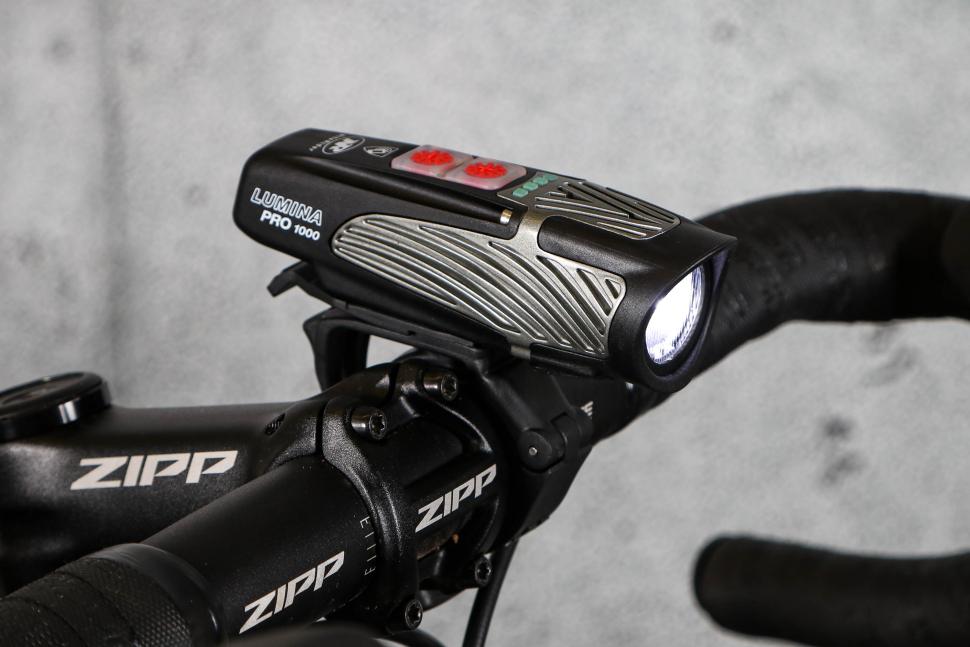 2023 NiteRider Lumina Pro 1000 Front Bike Light.jpg
2023 NiteRider Lumina Pro 1000 Front Bike Light.jpg£140.00
VERDICT:
Pretty good for dark commutes or staying seen on gloomy days, but not the cheapest or longest running
Good tool-free mount
Bright enough for fast riding
Easy-to-use interface
Higher settings have limited battery life
Weight:
192g
Contact:
At road.cc every product is thoroughly tested for as long as it takes to get a proper insight into how well it works. Our reviewers are experienced cyclists that we trust to be objective. While we strive to ensure that opinions expressed are backed up by facts, reviews are by their nature an informed opinion, not a definitive verdict. We don't intentionally try to break anything (except locks) but we do try to look for weak points in any design. The overall score is not just an average of the other scores: it reflects both a product's function and value – with value determined by how a product compares with items of similar spec, quality, and price.
What the road.cc scores meanGood scores are more common than bad, because fortunately good products are more common than bad.
- Exceptional
- Excellent
- Very Good
- Good
- Quite good
- Average
- Not so good
- Poor
- Bad
- Appalling
The NiteRider Lumina Pro 1000 packs a punch for riding in the dark, and features lots of different modes to choose from. The tool-free mount can fit larger handlebars and is easy to swap between bikes, making it very versatile. The light's only real drawback is that battery life isn't great in the highest modes, for longer night rides, and it's a little on the pricey side. Check out our guide to the best front lights for more options.
The Lumina Pro 1000 is really simple and quick to fit, using a tool-free mount that's secured with a thumbscrew. The light slides into the mount, clipping into place securely, and the position of the light can be adjusted to get the beam pointing exactly where you want.
This mounting system can also work on some helmets, so you could run it as a headtorch; given its weight of 193g, it doesn't feel too cumbersome.
Modes & run-times
The light features eight different modes: five continuous steady beams and three flashing. These max out at 1,000 lumens in the Boost steady mode, and 750 lumens for all three flashing modes.
On dark, unlit roads the 1,000-lumen Boost enables you to see far enough ahead to avoid any obstacles and keep a good speed going. However, the benefits of the brightness come at the expense of battery life. It has a claimed run-time of an hour at 1,000 lumens, though I found I got slightly more than that. That's enough if you're doing a short commute, but if you're looking to take to the darkness for longer then it's a bit limiting.
The next-brightest solid beam, High, at 750 lumens isn't hugely better at 1 hour 30 minutes (though again, I got slightly more on test), and I had to resort to the Medium mode for longer rides. While the run-time on this is far better at 3hrs 30mins, it only puts out 300 lumens. I found this okay when riding on lit roads where my main priority was to be seen, but on unlit roads I had to alter my riding quite a lot to accommodate the lack of brightness.
There's also a Low mode, 200 lumens, which lasts 6 hours.
Battery life is much less of an issue in the flashing modes, where the Super Flash will give you 8 hours of life.
You also get a 50-lumen Walk mode, which gives a reasonably competitive 21 hours.
Charging
To charge the light back to full takes four hours, using the USB-C cable supplied in the box.
Battery life is indicated by the lights on top, which also indicate the mode and remaining power. These range from green when full, to red when there is around 15 minutes of charge left. Another warning comes with a flashing red light with 7 minutes of battery to go. At this stage the light will dip into a lower mode to conserve juice.
Operating the light is really simple: two buttons allow you to scroll through the modes easily and quickly – in the solid modes, higher with the plus button, lower with the minus; in the flashing modes, changing the patterns. The buttons are easy to operate, even in full-finger gloves.
An IP64 rating keeps the light both water and dust resistant, and though '4' isn't the highest waterproof rating, even when riding in horrible weather with plenty of dirt the light functioned just as expected without any issues.
Value
Though the Lumina Pro 1000 is a good light, I think its £140 rrp is a little steep compared with others out there.
The latest Moon Meteor Storm Pro, for example, has come down in price since our review in 2017, to £120, and has a new high max output of 2,000 lumens, with a claimed battery life of 2 hours at 2,000 lumens – twice the power and run-time of the NiteRider.
And if you have a look at the lights listed in the beam comparison engine above, you'll see quite a few offering claimed higher output for less – the Ravemen LR1600, for example, is £115, and the Magicshine Ray 2600B is £129.99 – though the performances don't always match the numbers, it has to be said. Or keeping to lower outputs there are much cheaper options: Cateye's AMPP 1100 is £79.99, Lezyne's Micro Drive Pro 1000+ is £75, and Gaciron's Kiwi-1200 is £65.
Conclusion
Overall, the NiteRider Lumina 1000 is a pretty good light for dark commutes or staying seen on gloomy days. It's easy to use and can be swapped quickly between bikes, but longer run-times and a lower price would add appeal.
Verdict
Pretty good for dark commutes or staying seen on gloomy days, but not the cheapest or longest running
road.cc test report
Make and model: NiteRider Lumina Pro 1000 Front Bike Light
Size tested: 1,000 lumens
Tell us what the light is for, and who it's aimed at. What do the manufacturers say about it? How does that compare to your own feelings about it?
NiteRider says: 'Boasting 1000 lumens with a sleek form factor and a collimator lense that lends to a brilliant and even light beam pattern! NiteRider® makes this newcomer USB-C rechargeable for convenient on-the-go charging. A feature of note on the 1000 are color-coded light modes shown through the dual button power switch. Its light weight at 193 grams makes it quite suitable as a helmet mountable option as well as bar compatible''standard and oversized diameters. The Lumina™ Pro 1000 features a highly durable light housing with Fiberglass reinforced nylon meeting all required FL1 Standards for run times, impact testing and dust/water resistance.'
Tell us some more about the technical aspects of the light?
From NiteRider:
Lumen Output: 1000
8 Modes with Run Times: 1:00-21:00h
Charge Time: 4:00h
Weight: 193 grams
Water / Dust Resistant IP64 Rated
Dual Button Power Switch, Brighter (+)/ Dimmer (-)
USB-C Rechargeable
Includes: Lumina™ Pro 1000 front light, handlebar clamp mount and USB-C charging cable
Rate the light for quality of construction:
9/10
Well built and tough design. Really easy to fit and stays firmly in place when riding.
Rate the light for design and ease of use. How simple was the light to use?
9/10
Really easy to use. The large buttons and simple user interface make it quick to cycle through modes and increase/decrease power while seeing how much charge is left over.
Rate the light for the design and usability of the clamping system/s
8/10
A very solid and simple tool-free clamping system using a thumb screw keeps the light firmly in place. It's also compatible with a range of handlebars.
Rate the light for waterproofing. How did it stand up to the elements?
8/10
Really well. I used it in some very heavy rain and muddy conditions and there were no issues.
Rate the light for battery life. How long did it last? How long did it take to recharge?
6/10
For the price and in comparison with other similarly sized lights the battery life is okay rather than great. It lasted just over an hour on its brightest mode and took four hours roughly to recharge.
Rate the light for performance:
7/10
On the two highest modes the light is a really good performer, providing lots of visibility and a good beam pattern, but this is slightly affected by battery life and the need to run a lower mode when riding for longer.
Rate the light for durability:
7/10
No issues at all despite the weather, and the quality of build means it's held up well so far.
Rate the light for weight:
6/10
It's heavier than some lights of similar power, such as the Exposure Sirius MK10, but it still isn't that heavy.
Rate the light for value:
4/10
There are some cheaper lights that share the same levels of brightness (see below), but the mount does make it feel a little more premium. It's still a little on the pricey side, but not unreasonable.
How does the price compare to that of similar products in the market, including ones recently tested on road.cc?
There are lights offering claimed higher output for less, such as the Ravemen LR1600 at £115, and the Magicshine Ray 2600B for £129.99, and keeping to lower outputs there are much cheaper options: Cateye's AMPP 1100 is £79.99, Lezyne's Micro Drive Pro 1000+ is £75, and Gaciron's Kiwi-1200 is £65.
Tell us how the light performed overall when used for its designed purpose
It has a good quality beam for riding at night and is bright enough to make you feel safe around traffic. The mount is also great, and easy to swap between bikes.
Tell us what you particularly liked about the light
The easy-to-use buttons and the mount.
Tell us what you particularly disliked about the light
Battery life is a bit short on the higher settings.
Did you enjoy using the light? Yes
Would you consider buying the light? Yes
Would you recommend the light to a friend? Yes
Use this box to explain your overall score
Overall I'd say it's pretty good. It's robust and easy to use, with a good beam and quick, simple fitting. The battery life isn't great in the brighter modes, and it could be a little lighter, but overall it's a decent option, though the price is a little steep.
About the tester
Age: 21
I usually ride: Windover Bostal My best bike is: Windover Bostal
I've been riding for: 10-20 years I ride: Every day I would class myself as: Semi pro
I regularly do the following types of riding: road racing, time trialling, cyclo cross, commuting, touring, mtb, Gravel and ultra-endurance racing







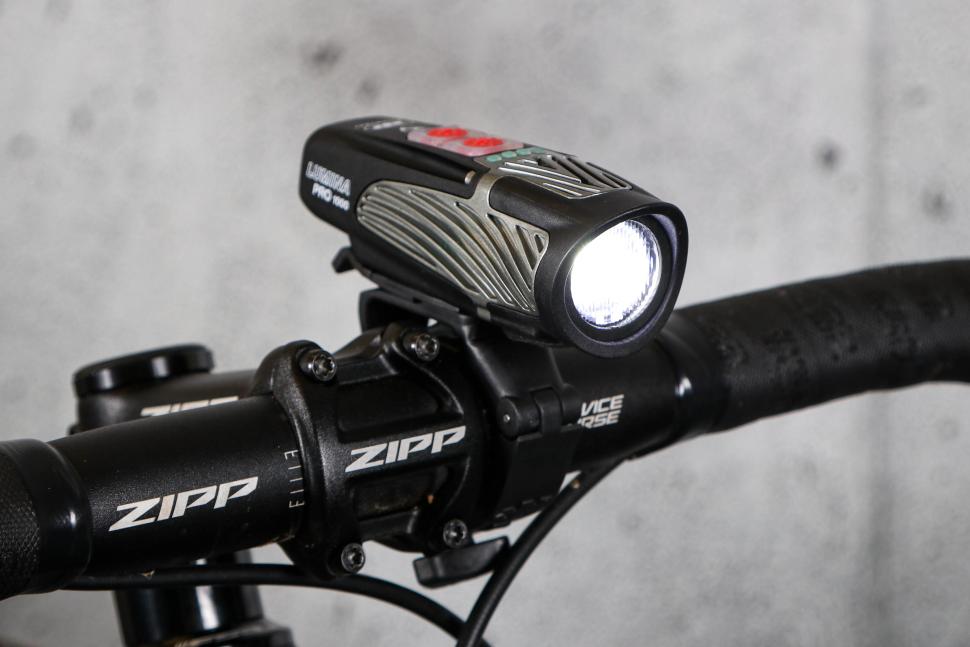


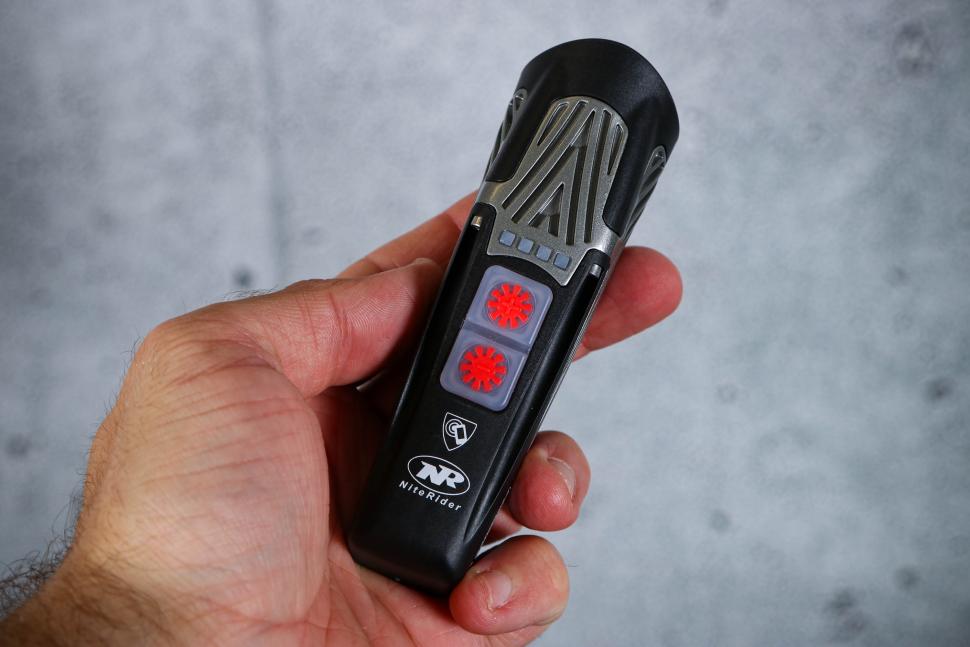
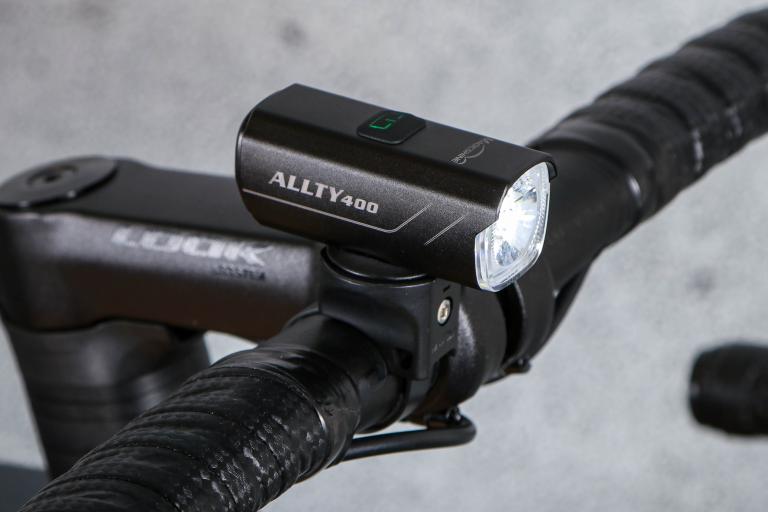
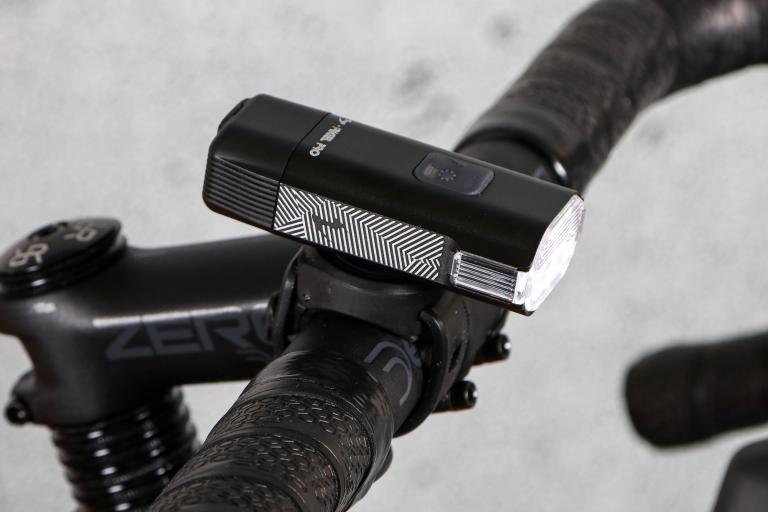
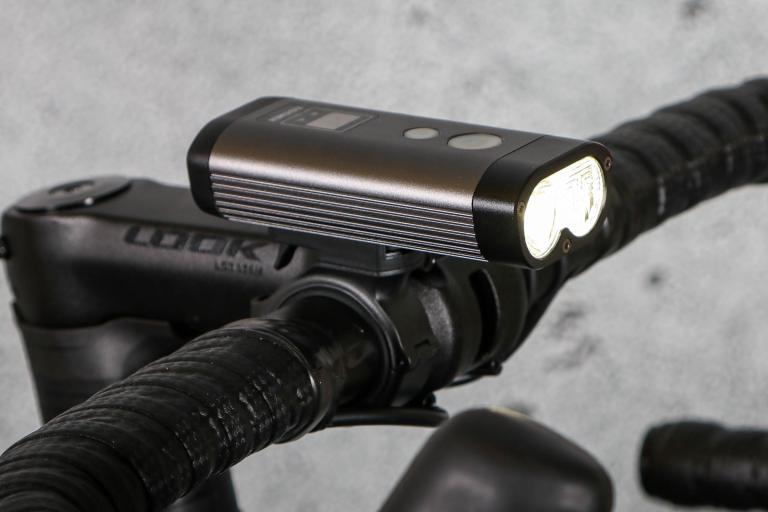
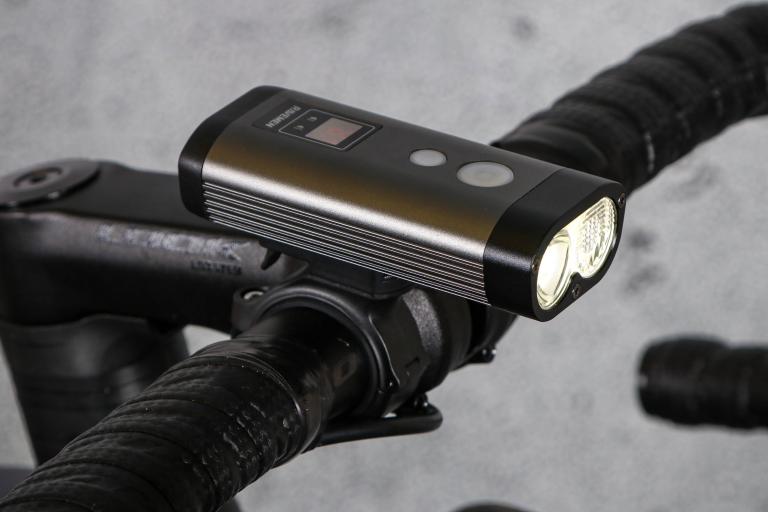
Also in Richmond, Richmond Park is a prime example of where cyclists are discriminated against and marginalised....
A363 Bradford on Avon: 'Five cars' crash near golf club...
The key really is headwind/drag not terrain. It just so happens that climbing speeds are lower so there is often less drag so less extra power is...
Same here, the judge can rule that the defendant should go to trial on a more serious charge even if prosecutors are prepared to accept a guilty...
FIRMO123...
Third that.
And numerous other cases where pedestrians have been killed by oh so innocent drivers.
The street in the York letter is at the end of my road and it is, as the writer says, abysmal. Slalom of parked cars and then drivers ignoring the...
But wasn't Eurosport always part of the the Sky TV package? I think even if you didn't subscribe to Sky Sports it came as part of the basic deal,...
No, because the guarantee is not transferable, so expires if you sell the bike. Had you had the bike from new, then I'm not sure because I don't...